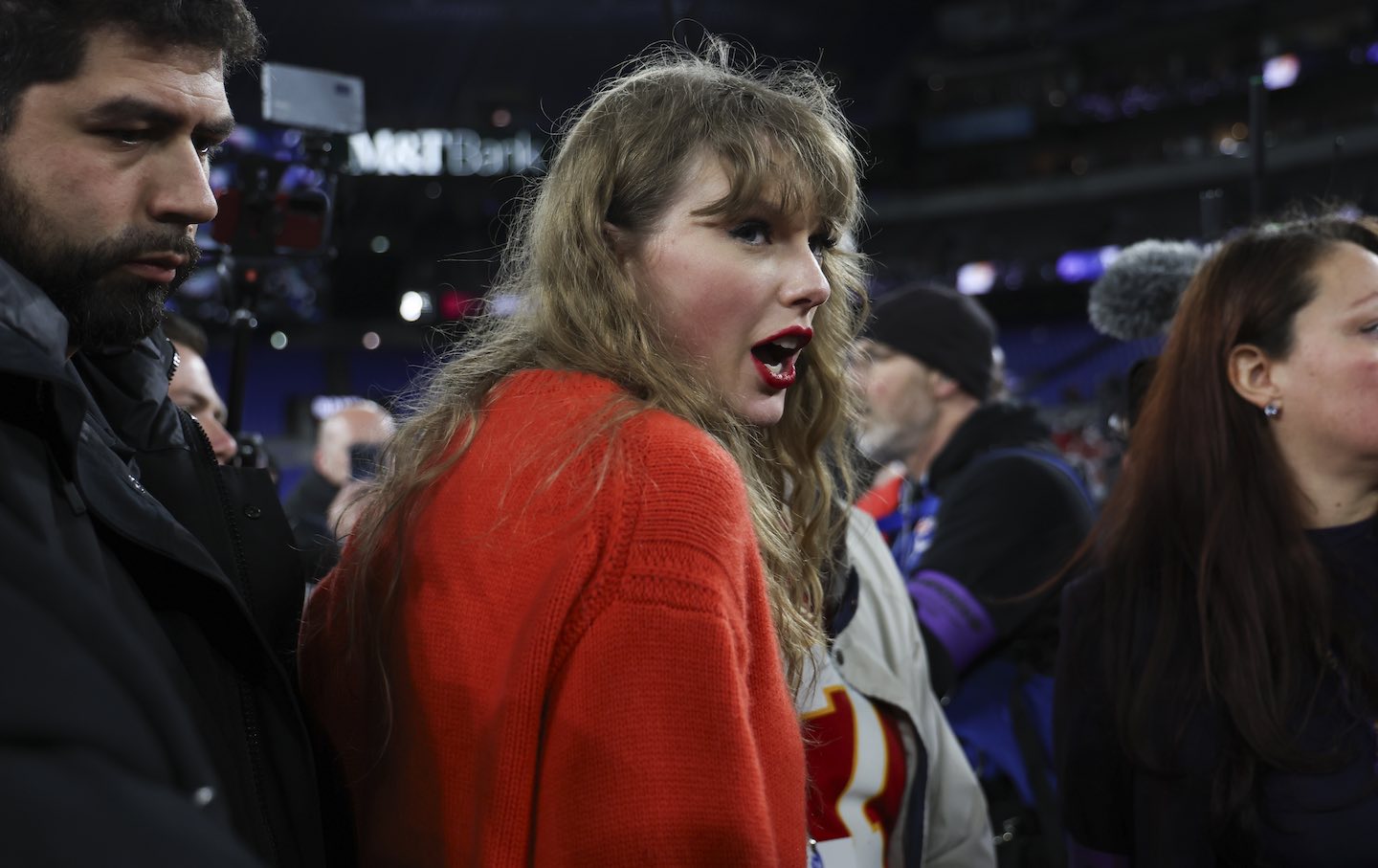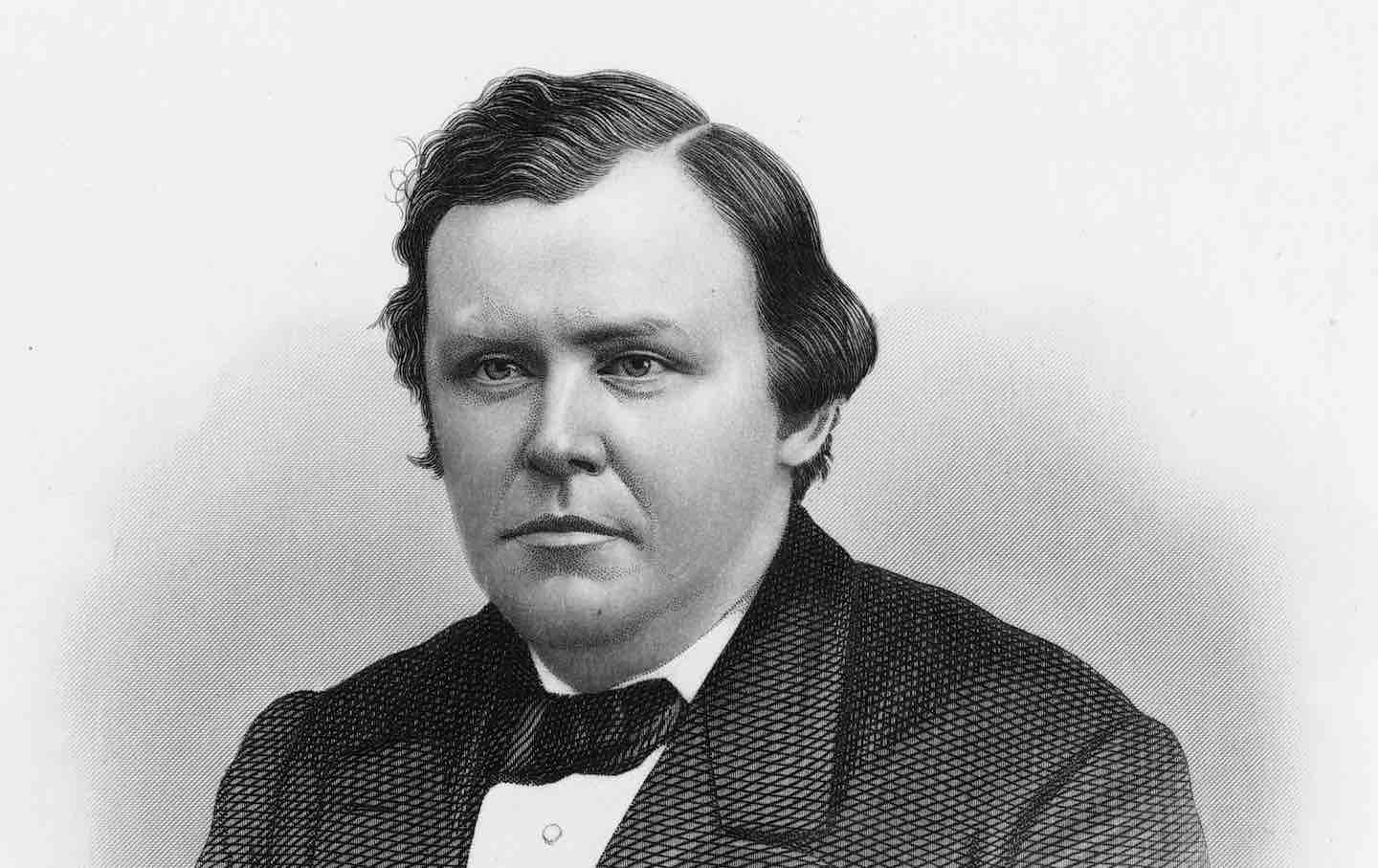Taylor Swift, Enemy of the People
The MAGA movement—including the big man himself—has gone on the offensive against the megastar pop singer.

Taylor Swift reacts after the AFC championship game between the Kansas City Chiefs and the Baltimore Ravens at M&T Bank Stadium on January 28, 2024, in Baltimore, Md.
(Kara Durrette / Getty Images)Don’t tell them to shake it off. This week, the right-wing grievance-industrial complex has gone into overdrive, designating pop star Taylor Swift as the beneficiary of a cunning deep-state psy-op, a shill for Biden-and-Fauci-branded high conspiracism, a Pentagon asset, and a Yoko Ono figure determined to wrest the great civic religious rites of Super Bowl observance out of the horny-handed grasp of Real Americans. You can sample the sprawling, exhausting litany of Swift speculations, accusations, and hallucinations here.
This MAGA variant of Swift-boating has also overtaken the inner sanctums of the Trump campaign, per a Rolling Stone dispatch. Reporters Adam Rawnsley and Asawin Suebsaeng write that the 45th president is obsessed with the petty and demonstrably false notion that he’s more popular than the megastar recording artist, and that the 2024 Trump risorgimento effort will serve as a “holy war” against all things Swift. Sensing a new lurch in the right-wing zeitgeist, Fox News anchor Sean Hannity has backtracked his earlier defenses of Swift from MAGA inquisitors and issued a mob-like directive for her to “think twice” ahead of any plans to endorse Biden for president this year.
Hannity’s outburst, unlike other flourishes of Swift-themed paranoia on the right (yes, I’m looking at you, Vivek Ramaswamy), at least referenced something real. Swift endorsed Biden in 2020, and her outspoken support for LGBTQ+ rights and efforts to promote widespread voter participation may well likely send her back into the Biden camp in 2024. But clearly the raging culture war targeting Swift is about much, much more than the politics of celebrity presidential endorsements. Swift serves as just the latest symbolic quarry for the acute anxieties of a patriarchal order that dogmatically views the independent activism of single women as not merely illegitimate but unthinkable. A frequent refrain among Swift detractors on the right is that her juggernaut popularity seems as though it’s not “organic,” or is otherwise inauthentic—which is mostly an admission that it’s an affront (and therefore a threat) to the proper gendered order of things.
It’s a culture-war fixation that harks back to the origins of our modern politics in the 1920s, when the “new woman” and the flapper were derided as avatars of unholy sexual license and civilizational downfall. (Swift herself seems aware of this connection, since she has long donned flapper dresses on tour and in videos.) Throughout the dismal annals of postwar culture warfare, single women have often served as targets of first resort. The disorder runs so deep that, in response to the 1992 riots in Los Angeles over the brutal police beating of Rodney King, Vice President Dan Quayle attributed the deeper roots of the uprising to the decision of fictional sitcom career woman Murphy Brown to bear a child out of wedlock. (Lest one think that such unhinged scapegoating is an exclusive right-wing trademark, during that same demented election season, candidate Bill Clinton made the single rapper Sistah Souljah the target of a racialized culture-war sermon of his own, while Barack Obama would dedicate a whole lavishly funded policy initiative, My Brother’s Keeper, to reclaiming patriarchal order in the Black family.) In between his other obsessive tirades over toilet plumbing and wind turbines, Donald Trump has regularly let loose on headstrong female celebrities Rosie O’Donnell and Bette Midler for assorted crimes against MAGA orthodoxy. (Doting on such past-their-prime B-listers is yet another sign that Trump’s mental OS remains stuck on its 1980s factory settings.)
Yet what’s triggering the present anti-Swift gender panic on the right is, oddly enough, her decision to be not quite so single—she’s been dating Kansas City Chiefs tight end Travis Kelce, and turning up at skyboxes and sidelines during the Chiefs’ playoff run. While you might think that the guardians of imperiled Real American social mores would welcome a prodigal pop star into the NFL fold—on the side of a team bearing a militantly racist name, no less—and count it as a provisional win for Team MAGA, you would of course be wrong. Instead of palliating the anxieties of the male-heavy NFL fan base, Swift’s incursion on NFL turf turned all the relevant gender panics in play up to 11. After having rallied behind Donald Trump’s ugly racialized politicization of the protests of police killings pioneered by Colin Kaepernick, the MAGA right has unleashed every imaginable culture-themed fury on both Swift and Kelce.
What’s striking in this campaign is the extent to which MAGA culture warriors have feminized Kelce. After the tight end signed a $20 million endorsement deal with Pfizer to promote flu and Covid vaccines, he became, in the classic Henrik Ibsen sense, an enemy of the people. Anti-vaxx and pro-conspiracy New York Jets quarterback Aaron Rodgers predictably began baiting Kelce as “Mr. Pfizer,” and Kelce’s Pfizer affiliation would go on to serve as a linchpin in the great rolling theory of the whole Swift-Kelce alliance as an elaborate psy-op targeting the sainted frontier individualism of the NFL. After all, a football player who would bend the knee to Faucism is clearly primed to betray any and all heroic American male birthrights.
It’s true that at least some of the great right-wing Swift freakout can be attributed to the sheer blinding power of her celebrity. With the Chiefs returning to the Super Bowl for a fourth time next Sunday, the specter of Taylor Swift’s becoming the best known superfan of a bona fide NFL dynasty would trigger an event horizon on an unparalleled scale in American pop culture. Still, it bears repeating that in what’s quaintly known as real life in our deranged republic of mass culture, all that’s really happening here is that an extremely famous pop star has been keeping company with a reasonably famous football player. When former New York Yankees infielder Alex Rodriguez and pop diva Jennifer Lopez were an item, all that happened in our political cum cultural discourse was the sampling of dumb couple rubrics. Maybe, just maybe, it’s not Taylor Swift and Travis Kelce who are the stealth agents of a rampantly weaponized and politicized popular culture.








